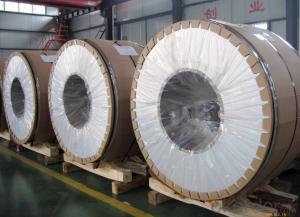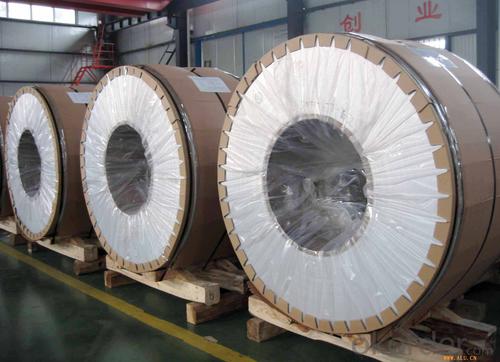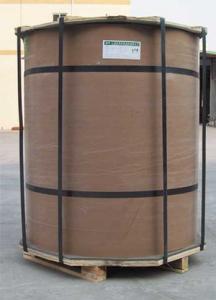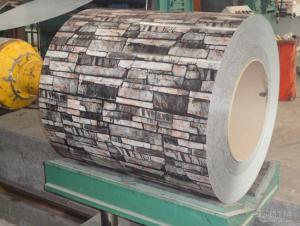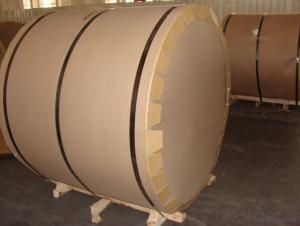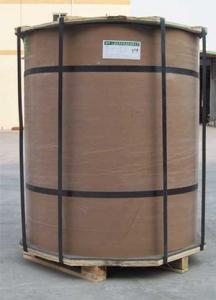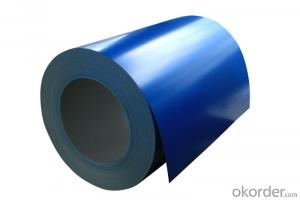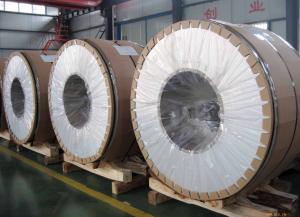Color Coated 5xxx Mill-Finished Aluminum Coil
- Loading Port:
- China Main Port
- Payment Terms:
- TT OR LC
- Min Order Qty:
- -
- Supply Capability:
- -
OKorder Service Pledge
OKorder Financial Service
You Might Also Like
Specifications
Aluminum coil
1.Fine craftsmanship
2.Durable
3.Easy processing
aluminum coil
color coated aluminum coil
embossed aluminim coil
| Alloy NO. | 1000series: 1050 1060 1070 1100 1200 1235 3000series: 3003 3004 3105 3A21 5000series: 5052 5083 5754 |
Temper | O\H12\H14\H16\H18\H22\H24\H26\H32\H34 |
Specification | thickness:0.2mm-10.0mm Width:90mm-1600mm |
Surface treatment | coated,polished,embossed, etc |
Colors | Customized |
Features | High weather resistance \anti scratch anticorrosion \ subtle edges and elegant appearance \ easy processing and installation\ high brightness and hardness. |
Application |
Construction /Furniture/decorate/industry,etc. |
Package | Standard seaworthy export packing: wooden pallets with plastics protection |
Payment terms | 30% TT deposit, 70% TT before shipment . |
Delivery time | About 25-30 days after receiving the deposit |
MOQ | 5 metric tons |
- Q: Can aluminum coils be customized?
- Indeed, it is possible to customize aluminum coils to meet specific requirements. These coils possess remarkable versatility, as they can be tailored in terms of thickness, width, length, alloy composition, surface finish, and other specifications. Consequently, they find extensive utility across diverse industries, including construction, automotive, aerospace, electronics, and packaging. The customization of aluminum coils involves various processes, such as slitting, cutting-to-length, embossing, painting, and coating. This remarkable flexibility in customization empowers manufacturers to satisfy the distinct demands of their clientele, thereby ensuring that the aluminum coils are perfectly optimized for their intended applications.
- Q: What are the potential hazards associated with handling aluminum coils?
- Handling aluminum coils comes with several potential hazards. One major concern is the risk of physical injury. Improper lifting or movement of the heavy coils can lead to strain or sprain injuries. Workers must handle them correctly to avoid such incidents. Furthermore, if the coils are not stacked or stored securely, they may fall and cause harm to workers. Another hazard associated with aluminum coils is the presence of sharp edges. Careless handling can result in cuts or lacerations from the coils' sharp edges or burrs. To minimize the risk of injury, workers should wear appropriate gloves and protective clothing. Another potential danger is the risk of fire or explosion. Aluminum is highly flammable when it comes into contact with certain substances, such as acids or alkalis. Therefore, it is crucial to store aluminum coils in a cool and dry place, away from any flammable materials. Moreover, aluminum coils pose a respiratory hazard. Manipulating or cutting them can release dust or particles into the air, which can cause respiratory irritation or even lung damage. Therefore, workers should wear appropriate respiratory protection when handling aluminum coils. Lastly, aluminum coils can also present a chemical hazard. Some aluminum coils may be coated or treated with chemicals that can be toxic or irritating to the skin and eyes. It is essential for workers to be aware of the specific hazards associated with the type of aluminum coil they are working with and take necessary precautions, such as wearing protective clothing and eye protection. Overall, workers must be aware of the potential hazards linked to aluminum coil handling and take appropriate safety measures to minimize risks. Regular training, proper lifting techniques, the use of protective equipment, and safe storage practices are all vital steps in ensuring the safety of workers who handle aluminum coils.
- Q: What are the common packaging options for aluminum coils?
- Common packaging options for aluminum coils include the use of wooden pallets, steel or aluminum cradles, and cardboard or plastic wrapping. These packaging options are designed to provide protection and ensure the safe transportation and storage of the coils. Wooden pallets are commonly used as a base for stacking the coils, providing stability and ease of handling. Steel or aluminum cradles are often used to hold the coils in place, preventing movement and potential damage during transit. Additionally, the coils may be wrapped in cardboard or plastic to offer an extra layer of protection against moisture and other environmental factors. These packaging options are frequently used in the aluminum industry to preserve the quality and integrity of the coils until they reach their destination.
- Q: Can aluminum coils be used in the production of beverage cans?
- Yes, aluminum coils can be used in the production of beverage cans. Aluminum coils are commonly used because aluminum is lightweight, corrosion-resistant, and recyclable, making it an ideal material for beverage cans. The coils are typically formed into can bodies and lids, which are then further processed to create the final beverage cans.
- Q: Can aluminum coils be used in agricultural applications?
- Yes, aluminum coils can be used in agricultural applications. Aluminum is a versatile and durable material that can withstand various environmental conditions, making it suitable for agricultural equipment such as irrigation systems, greenhouse structures, and ventilation systems. Additionally, aluminum's light weight and corrosion-resistant properties make it an ideal choice for agricultural applications where durability and long-term performance are essential.
- Q: Describe the steps involved in the production of aluminum coil.
- <p>The process of making aluminum coil involves several key steps. Initially, raw materials, typically bauxite ore, are mined and then refined to produce aluminum oxide. This aluminum oxide is then reduced to aluminum metal through the Hall-H茅roult process, where it is dissolved in molten cryolite and electrolyzed to extract aluminum. Once the aluminum is produced, it is melted and then continuously cast into large slabs or billets. These slabs are then hot or cold rolled to reduce their thickness and width, forming coils. The coils are annealed to improve their mechanical properties and surface finish. Finally, the aluminum coils are cleaned, inspected, and cut to size before being packaged and shipped to customers for various applications such as construction, automotive, and packaging.</p>
- Q: Automotive aluminum coil, using GB H22, what brand, what are the main ingredients?
- 5754-H22 aluminum sheet has the characteristics of medium strength, good corrosion resistance, weldability and easy processing. It is a typical alloy in Al-Mg (mg Al alloy) alloy. In the corresponding foreign brands for AlMg3, 5754 different heat treatment is the automobile manufacturing industry (car door, mould, seals), main materials used for canning industry
- Q: What precautions should we take to maintain health while using aluminum coils?
- <p>To protect our health when using aluminum coils, it's important to ensure that the coils are used in a manner that minimizes the release of aluminum into the environment or food. This can be achieved by avoiding high heat, as aluminum can leach more easily into food at high temperatures. Use aluminum coils in well-ventilated areas to minimize inhalation of fumes. Additionally, it's crucial to clean the coils properly to remove any residue that could contain aluminum. Regularly inspect the coils for any signs of wear or damage, as this can increase the risk of aluminum exposure. Finally, consider using alternatives to aluminum coils, such as stainless steel or cast iron, which are less likely to release harmful substances.</p>
- Q: Explain the distinctions among various types of aluminum coils, including their properties and applications.
- <p>Aluminum coils are differentiated based on their alloy composition, thickness, temper, and surface finish. Common types include 1000 series coils, which are pure aluminum with high ductility but low strength; 3000 series, known for their formability and used in cookware; 5000 series, which are non-heat-treatable and corrosion-resistant; and 6000 series, offering a balance of strength and corrosion resistance. Thickness varies from thin gauges for flexible applications to thick gauges for structural use. Tempers range from soft (O temper) to fully hard (H temper), affecting the coil's hardness and strength. Surface finishes can be plain, coated, or embossed, impacting aesthetics and performance. Each type is chosen based on specific industry requirements like construction, automotive, or packaging.</p>
- Q: How do aluminum coils contribute to thermal management?
- Aluminum coils play a crucial role in thermal management due to their excellent heat transfer capabilities. Aluminum has a high thermal conductivity, which means it can efficiently transfer heat from one area to another. This property is essential in various applications that require effective thermal management, such as air conditioning systems, refrigeration units, and heat exchangers. In air conditioning systems, aluminum coils are commonly used in the condenser and evaporator coils. The condenser coil dissipates heat from the refrigerant to the surrounding air, while the evaporator coil absorbs heat from the indoor air to cool it down. The high thermal conductivity of aluminum allows for efficient heat transfer between the refrigerant and the surrounding air, resulting in faster and more effective cooling. Similarly, in refrigeration units, aluminum coils are utilized in the evaporator coils to remove heat from the interior space. The aluminum coils help to extract heat from the refrigerated area and transfer it to the outside environment, maintaining a lower temperature inside the unit. Aluminum coils also find application in heat exchangers, which are used in a wide range of industries, including automotive, power generation, and HVAC. Heat exchangers are devices that transfer heat between two or more fluids, often with different temperatures. The high thermal conductivity of aluminum enables efficient heat exchange between the fluids, improving overall system performance and energy efficiency. Moreover, aluminum coils are lightweight and resistant to corrosion, making them highly durable and suitable for long-term use in harsh environments. These properties further enhance their contribution to thermal management by ensuring reliable heat transfer and reducing the risk of system failure or efficiency loss. In summary, aluminum coils are instrumental in thermal management systems as they facilitate efficient heat transfer, contribute to faster cooling or heating processes, and enhance overall system performance. Their high thermal conductivity, lightweight nature, and corrosion resistance make them a preferred choice in various applications where effective thermal management is essential.
Send your message to us
Color Coated 5xxx Mill-Finished Aluminum Coil
- Loading Port:
- China Main Port
- Payment Terms:
- TT OR LC
- Min Order Qty:
- -
- Supply Capability:
- -
OKorder Service Pledge
OKorder Financial Service
Similar products
Hot products
Hot Searches
Related keywords
